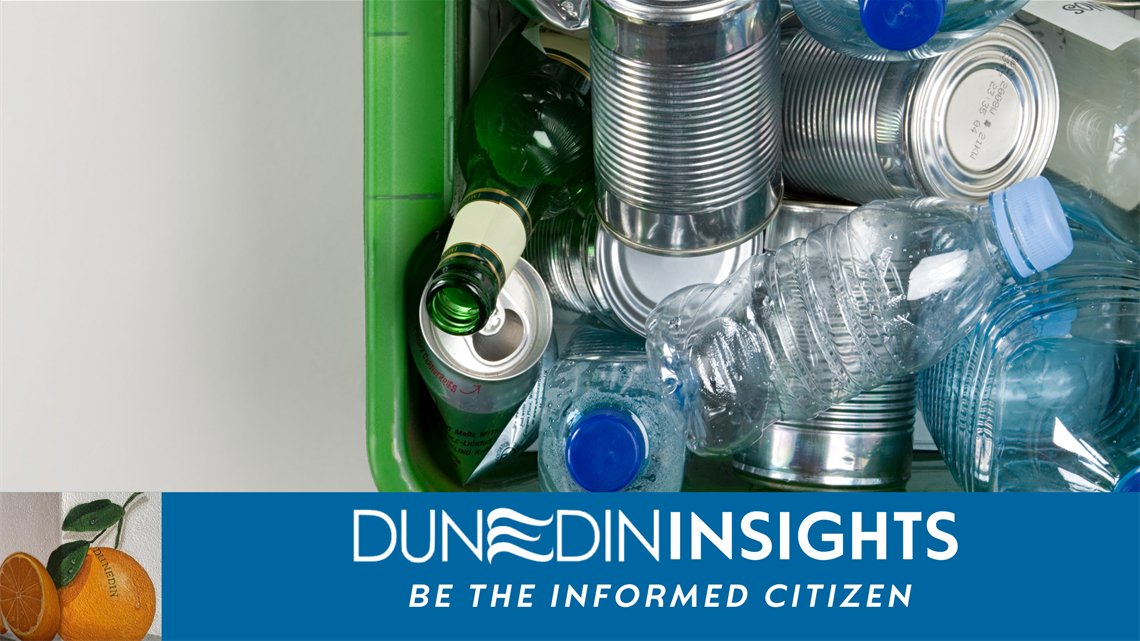Recycling 101: Your Guide to the Do’s and Don’ts
Published on September 10, 2025

Dos and Don’ts for Dunedin’s Mixed Recycling Program
You may have noticed our snazzy new Recycling Guides on the website or social media. Maybe they got you thinking: “Gee, I could really use a refresher on Dunedin’s recycling program.” (Because of course, you spend your spare time thinking about recycling, right?) Well, you’re in luck with today’s Dunedin Insights. Let’s bust a few myths, tackle some common questions, and talk about how to recycle right in Dunedin.
Are my recyclables actually getting recycled?
Yes! Dunedin is proud to say that all collected recycling is transported to a material recovery facility (MRF) operated by our current recycling contractor, Waste Pro. Materials are sorted, baled and sold into domestic markets.
The majority of Dunedin’s recycling is sold to companies in Georgia and Alabama where it undergoes further processing to be fully recycled or downcycled. Downcycling means turning something into a product of lesser quality, like plastic bottles becoming park benches or newspapers ending up as egg cartons.
The YES List
Dunedin has a straightforward recycling program that accepts:
-
Office paper, mail, magazines, newspaper, and paperboard
Keep items clean, dry, and loose! If it’s too difficult to clean, toss it in the garbage. If it’s wet, it lowers the quality of the whole load. And please, no bagged recycling. Bags tangle up machinery faster than the holiday lights bunched up in your attic.
The NO List
Technically, the “no” list could go on forever. So here’s your shortcut: if it’s not on the yes list, it’s on the no list. If you’re unsure, check the recycling guide on your cart or remember the motto: When in doubt, throw it out.
Some of the most common offenders are:
Stick to the Sticker
Recycling rules change depending on where you live. That’s why it’s so important to learn your local program. Just because a company slaps a recycling symbol on their product (looking at you, pizza boxes) doesn’t mean it’s recyclable in Dunedin.
Stick to the sticker on your cart—it’s your cheat sheet. If you need a new one, contact Dunedin Solid Waste at 727-298-3215 or solidwaste@dunedin.gov. Stickers are also available at City Hall.
Escaping Your “Ultra-Recycler” or “Wishcycling” Mentality
“I recycle everything” is a red flag. We know your heart’s in the right place, but wishcycling is public enemy #1 for recycling facilities.
Wishcycling is tossing in items hoping they’ll be recycled. Spoiler: they won’t. Instead, they cause jams, slow down the sorting process, or could even send otherwise good loads to the landfill. Think of it like leaving an old gift card as a tip at a restaurant. It might feel generous in the moment, but it negatively affects the person receiving it.
The Recycling Symbol is Not Your Friend
Meet public enemy #2: greenwashing.
Sorry to break it to you, but many items with the recycling symbol are not accepted in Dunedin’s mixed recycling program. That little triangle of arrows, AKA the mobius loop, isn’t regulated. Manufacturers can slap it on anything to make a product look eco-friendly, even if it has no business in your recycling cart.
The bottom line: don’t trust the symbol, stick to the sticker.
No Items Smaller than Your Fist
If an item is smaller than your fist (or a hockey puck), it’s not recyclable here. Leave the pucks to the Lightning.
Why? Because small items, like shredded paper, k-cups, small yogurt cups, or loose bottle caps, fall through machinery and jam up the system. If you want to recycle bottle caps, twist them on tight to the bottle first.
And remember: hazardous items like rechargeable batteries never go in the garbage or recycling. Always take them to a hazardous drop-off location. Visit the Pinellas County HEC3 program for details.
A Note on Worker Safety
And here’s why it matters: when non-recyclable items end up in the cart, they don’t just lower the quality of the load, they can put people at risk. Plastic bags, cords, clothing, and other “tanglers” can snarl sorting equipment, leading to dangerous conditions for workers who have to climb in and untangle the mess. In fact, refuse collection and processing is consistently ranked as one of the most dangerous jobs in the U.S. Keeping your cart clean and on the “yes list” is one of the simplest ways you can help protect the people who keep Dunedin’s recycling moving.